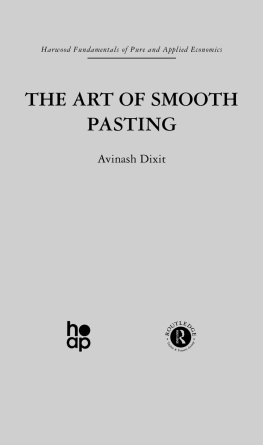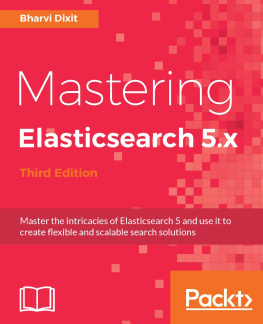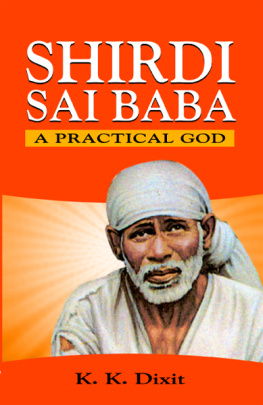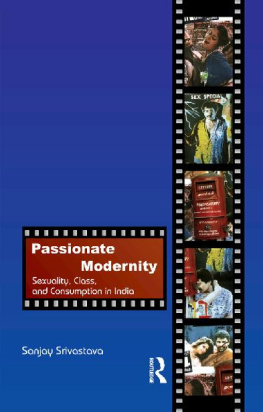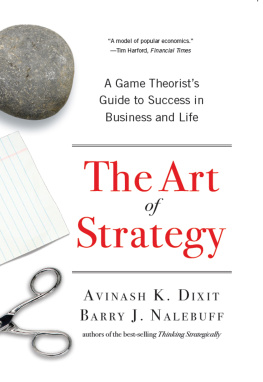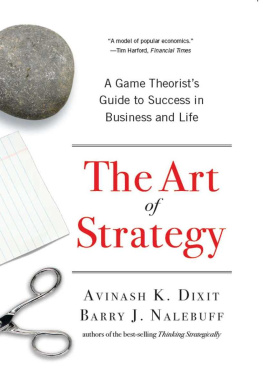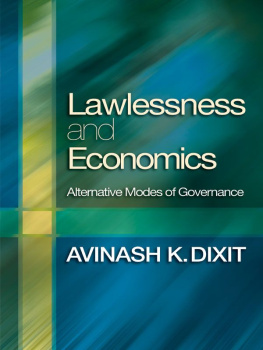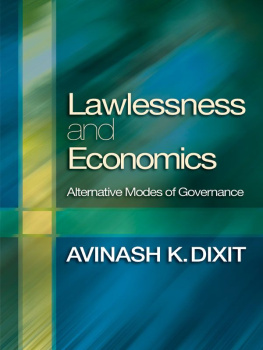Dixit - The Art of Smooth Pasting
Here you can read online Dixit - The Art of Smooth Pasting full text of the book (entire story) in english for free. Download pdf and epub, get meaning, cover and reviews about this ebook. publisher: Taylor & Francis (CAM), genre: Home and family. Description of the work, (preface) as well as reviews are available. Best literature library LitArk.com created for fans of good reading and offers a wide selection of genres:
Romance novel
Science fiction
Adventure
Detective
Science
History
Home and family
Prose
Art
Politics
Computer
Non-fiction
Religion
Business
Children
Humor
Choose a favorite category and find really read worthwhile books. Enjoy immersion in the world of imagination, feel the emotions of the characters or learn something new for yourself, make an fascinating discovery.
- Book:The Art of Smooth Pasting
- Author:
- Publisher:Taylor & Francis (CAM)
- Genre:
- Rating:5 / 5
- Favourites:Add to favourites
- Your mark:
- 100
- 1
- 2
- 3
- 4
- 5
The Art of Smooth Pasting: summary, description and annotation
We offer to read an annotation, description, summary or preface (depends on what the author of the book "The Art of Smooth Pasting" wrote himself). If you haven't found the necessary information about the book — write in the comments, we will try to find it.
Dixit: author's other books
Who wrote The Art of Smooth Pasting? Find out the surname, the name of the author of the book and a list of all author's works by series.
The Art of Smooth Pasting — read online for free the complete book (whole text) full work
Below is the text of the book, divided by pages. System saving the place of the last page read, allows you to conveniently read the book "The Art of Smooth Pasting" online for free, without having to search again every time where you left off. Put a bookmark, and you can go to the page where you finished reading at any time.
Font size:
Interval:
Bookmark:

Harwood Fundamentals of Pure and Applied Economics
THE ART OF SMOOTH
PASTING


FUNDAMENTALS OF PURE AND APPLIED ECONOMICS
EDITORS IN CHIEF
J. LESOURNE, Conservatoire National des Arts et Mtiers, Paris, France
H. SONNENSCHEIN, University of Pennsylvania, Philadelphia, PA, USA
ADVISORY BOARD
K. ARROW, Stanford, CA, USA
W. BAUMOL, Princeton, NJ, USA
W. A. LEWIS, Princeton, NJ, USA
S. TSURU, Tokyo, Japan
ECONOMIC MODELLING
In 2 Volumes
| I | Bayesian Implementation | Palfrey and Srivastava |
| II | The Art of Smooth Pasting | Dixit |
Pasting
Avinash Dixit

First published in 1993 by
Harwood Academic Publishers GmbH
Reprinted in 2001 by
Routledge
2 Park Square, Milton Park, Abingdon, Oxon, OX14 4RN
Simultaneously published in the USA and Canada by Routledge
711 Third Avenue, New York, NY 10017
Transferred to Digital Printing 2003
Routledge is an imprint of the Taylor & Francis Group
1993 OPA (Overseas Publishers Association) N.V. Published by license under the Harwood Academic Publishers imprint, part of the Gordon and Breach Publishing Group.
All rights reserved. No part of this book may be reprinted or reproduced or utilized in any form or by any electronic, mechanical, or other means, now known or hereafter invented, including photocopying and recording, or in any information storage or retrieval system, without permission in writing from the publishers.
The publishers have made every effort to contact authors/copyright holders of the works reprinted in Harwood Fundamentals of Pure & Applied Economics . This has not been possible in every case, however, and we would welcome correspondence from those individuals/companies we have been unable to trace.
These reprints are taken from original copies of each book in many cases the condition of these originals is not perfect the publisher has gone to great lengths to ensure the quality of these reprints, but wishes to point out that certain characteristics of the original copies will, of necessity, be apparent in reprints thereof.
British Library Cataloguing in Publication Data
A CIP catalogue record for this book
is available from the British Library
The Art of Smooth Pasting
ISBN 0-415-26937-7
Economic Modelling: 2 Volumes
ISBN 0-415-26935-0
Harwood Fundamentals of Pure & Applied Economics
ISBN 0-415-26907-5
The Art of Smooth Pasting
Avinash Dixit
Princeton University, New Jersey, USA
A volume in the Stochastic Methods in Economic Analysis section

Copyright 1993 OPA (Overseas Publishers Association) N. V. Published by license under the Harwood Academic Publishers imprint, part of The Gordon and Breach Publishing Group.
All rights reserved.
First published 1993
Second printing 1994
Third printing 1999
No part of this book may be reproduced or utilized in any form or by any means, electronic or mechanical, including photocopying and recording, or by any information storage or retrieval system, without permission in writing from the publisher. Printed in Singapore.
Amsteldijk 166
1st Floor
1079 LH Amsterdam
The Netherlands
Library of Congress Cafaloging-in-Publicafion Data
Dixit, Avinash K.
The art of smooth pasting / Avinash Dixit.
p. cm.(Fundamentals of pure and applied economics; v. 55)
Includes bibliographical references and index.
ISBN 3-7186-5384-2
1. Economics, Mathematical. 2. Brownian motion processes. I. Title. II. Series.
HB135.D577 1993
330'.01'51dc20
92-45249
CIP
Drawing on a personal network, an economist can still relatively easily stay well informed in the narrow field in which he works, but to keep up with the development of economics as a whole is a much more formidable challenge. Economists are confronted with difficulties associated with the rapid development of their discipline. There is a risk of 'balkanization' in economics, which may not be favorable to its development.
Fundamentals of Pure and Applied Economics has been created to meet this problem. The discipline of economics has been subdivided into sections (listed at the back of this volume). These sections comprise short books, each surveying the state of the art in a given area.
Each book starts with the basic elements and goes as far as the most advanced results. Each should be useful to professors needing material for lectures, to graduate students looking for a global view of a particular subject, to professional economists wishing to keep up with the development of their science, and to researchers seeking convenient information on questions that incidentally appear in their work.
Each book is thus a presentation of the state of the art in a particular field rather than a step-by-step analysis of the development of the literature. Each is a high-level presentation but accessible to anyone with a solid background in economics, whether engaged in business, government, international organizations, teaching, or research in related fields.
Three aspects of Fundamentals of Pure and Applied Economics should be emphasized:
- First, the project covers the whole field of economics, not only theoretical or mathematical economics.
- Second, the project is open-ended and the number of books is not predetermined. If new and interesting areas appear, they will generate additional books.
- Last, all the books making up each section will later be grouped to constitute one or several volumes of an Encyclopedia of Economics.
The editors of the sections are outstanding economists who have selected as authors for the series some of the finest specialists in the world.
Many recent stochastic dynamic models in economics and finance are based on the theory of Brownian motion and its control or regulation. A fully rigorous mathematical treatment of these topics, as found in most treatises on probability theory and stochastic processes, is beyond most economists' reach. That has deterred wider understanding and use of such models in economic research. The well-known exposition by Malliaris and Brock (1982) has met the needs of many financial economists, who need these techniques constantly and have greater reason to make a major investment in learning them. But other fields like international economics, macroeconomics, and even labor economics, have begun to find occasions to use Brownian motion and its control. Researchers in these fields have less reason to learn this theory with any rigor and detail, and would welcome an even simpler treatment. These notes attempt a very heuristic exposition aimed at such readers. Brownian motion is introduced as the limit of a random walk, and many of its important properties are derived as the limits of the corresponding results on random walks that can be proved using quite simple algebra. This approach has been used in books on stochastic processes, for example Cox and Miller (1965) and Bhattacharya and Waymire (1989); it was introduced in option pricing theory by Cox and Ross (1976) and Cox, Ross and Rubinstein (1979). Here I extend it to treat problems of control of Brownian motion, and derive the appropriate conditions by similar elementary algebraic methods followed by passage to limits.
Font size:
Interval:
Bookmark:
Similar books «The Art of Smooth Pasting»
Look at similar books to The Art of Smooth Pasting. We have selected literature similar in name and meaning in the hope of providing readers with more options to find new, interesting, not yet read works.
Discussion, reviews of the book The Art of Smooth Pasting and just readers' own opinions. Leave your comments, write what you think about the work, its meaning or the main characters. Specify what exactly you liked and what you didn't like, and why you think so.

